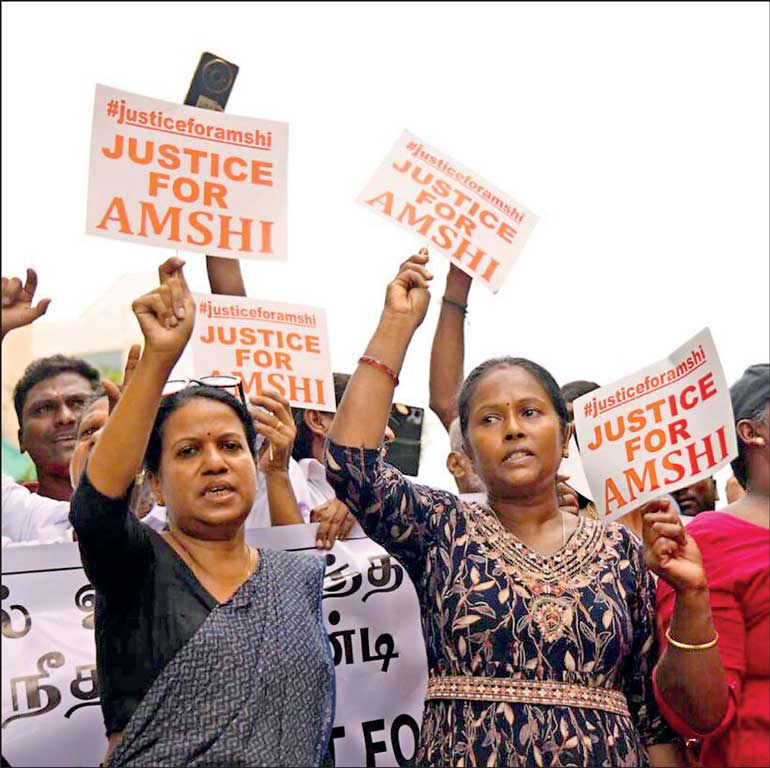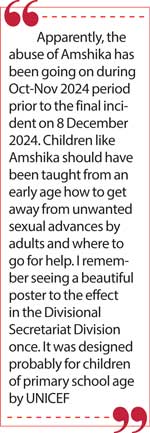Wednesday Feb 25, 2026
Wednesday Feb 25, 2026
Friday, 23 May 2025 00:22 - - {{hitsCtrl.values.hits}}

Even if the protocols were not there, how could our public servants have failed to honour the basic rules of justice to a child?
 From our colonisers we inherited a state consisting of a democratic representative system and an administrative system to support that. We have misused both inheritances to end up today with an ineffective and insensitive state. Nothing illustrates the present situation more than the untimely death of 15-year-old student Deshi Amshika by suicide on 29 April 2025.
From our colonisers we inherited a state consisting of a democratic representative system and an administrative system to support that. We have misused both inheritances to end up today with an ineffective and insensitive state. Nothing illustrates the present situation more than the untimely death of 15-year-old student Deshi Amshika by suicide on 29 April 2025.
As the timeline of events leading to the death of the child shows, the school, represented by the principal in this case, has suppressed repeated calls for help by the child and her family from the last reported day of the sexual abuse by a teacher on 8 December 2025, to her transfer to another school a month later. Education authorities at zonal level too washed their hands off by transferring the child to another school. Only the doctors at the Lady Ridgeway Children’s hospital did their duty by reporting child abuse to police after examining the child on 10 December 2024. Even then the protocol was not there for the hospital to alert the Ministry and the National Child Protection Authority (NCPA), and the accused teacher was able to function in the school with the full support of the principal until his arrest on 8 January 2025. During which time the child had told the mother “Why is no teacher speaking on my behalf, why is the accused sitting next to the principal, and why is everybody finding fault with me but not the perpetrator [Anidda, 18 May 2025]”.
Even if the protocols were not there, how could our public servants have failed to honour the basic rules of justice to a child? How come our politicians don’t have the sensitivity to first reach out to the grieved and aggrieved parents and then the honesty to acknowledge their policy failures?
A detailed look at the timeline shows that this event could happen anywhere to any child. The principal who seems to have acted unilaterally to protect the accused, could have been any principal anywhere faced with a similar situation because as the Child Protection Authority (CPA) of Sri Lanka correctly points out, the cause is embedded in the school culture as well as the larger social culture which suppresses grievances by even the most vulnerable victims to protect group interests.
“[T]he continued failure to report incidents of physical, mental and sexual abuse of children in schools, and such non-disclosures are often driven by efforts to protect the reputation of institutions or suppress victims’ voices (NCPA, 9 May 2025).”
At a webinar hosted by National Movement for Social Justice (NMSJ) recently, a director of NCPA further shed light on these group interests by naming the prevailing culture as a ‘rahe’ mentality, a ‘rahe’ being the name used by indigenous people of Sri Lanka to describe clan identity. It should be noted here that this reference is by no means an attempt to denigrate the ‘Rahe’ concept which would be fine in an indigenous social context.
Soon after the event the NCPA issued a series of directives which include mandatory reporting of any cases of child abuse to the NCPA, relieving suspects of duties pending investigation, no retraumatising of children during investigations, no pressuring or engaging in actions to marginalise them, or removing them from school. (https://www.ft.lk/news/NCPA-launches-special-probe-into-Kotahena-teen-s-death/56-776391)
 But we need mechanisms to counter the ‘Rahe’ mentality which is the root cause.
But we need mechanisms to counter the ‘Rahe’ mentality which is the root cause.
The ‘rahe’ mentality or group mentality is not limited to Sri Lanka. An interesting case is a paper by the Harvard Medical School originally titled “Tribalism: The Good, The Bad, and The Future” about specialty silos in medicine. The paper is about tribalism between groups of powerful grown-ups and their rejection of each other. Imagine a child shell-shocked by sexual abuse receiving a tribal response from those who are supposed to protect her.
Dilshi Amishka suicide timeline
(Based on Anidda newspaper of 18 May 2025, and additional sources on the Internet)
Dec 08, 2024 15-yr old Dilshi Amshika is allegedly molested by a math teacher at Ramanathan Hindu Ladies’ College, Bambalapitiya. Teachers, and the section head and principal are informed the same day by friends of Amshika. According to sources this is not the first abuse of Amshika by this teacher.
Dec 09, 2024 Mother makes a complaint to principal. The alleged molester is present at the session. He claims that the girl is mentally unstable and advice the mother take her to a mental hospital.
Dec 10, 2024 Mother takes Amshika to Lady Ridgeway hospital. Doctors find no mental illness in the child and conclude that Amshika is telling the truth about the abuse.
Later, the hospital’s judicial officer files a complaint with the Bambalapitiya Police and the police begin an inquiry.
Worried about police inquiries, the accused allegedly asks for an internal inquiry which rules in favor of the teacher. Rumor that Amshika is mentally unstable spreads across the school from that day on.
Jan 08, 2025 Teacher is arrested after investigation by police.
Jan 09, 2025 Principal allegedly tells members of School Development Society that the teacher is innocent and the SDS may have to spend about Rs. 10 lakhs to clear the good name of the school.
Jan 10, 2025 Teacher released on bail.
Jan .., 2025 Parents visit zonal office to request the child’s release to a school in Kotahena.
Jan .., 2025 Amshika is admitted to a school in Kotahena, and was happier at the new school according to her mother.
Jan 18, 2025 Amshika joins Rajeshwari tuition class in Kotahena. The owner of the tuition class claims that she lost consciousness in class that day and she was sent home after first-aid. She was unwell in subsequent classes as well he claims.
Feb 15, 2025 Amshika was humiliated at the tuition class about the incident at Ramanathan College, according to Amshika’s mother as interviewed by Anidda. This is Amshika’s last day at the tuition class.
Apr 29, 2025 AMSHIKA COMMITS SUICIDE
May 08, 2015 Complaint by parents to the Child Protection Authority via hotline 1929
Massive protest in front of school
Statement from Ministry of Education (MoE) informing the decision to transfer the teacher to Zahira College, Puttalam.
May 09, 2025 Debate in Parliament on Amshika’s death
Accused teacher is sent on compulsory leave by MoE.
NCPA issues directives to relevant authorities (https://www.ft.lk/news/NCPA-launches-special-probe-into-Kotahena-teen-s-death/56-776391)
May 10, 2025 Statement by Rajeshwari owner Shivanandaraj Natayanpillai in front of CID.
May 11, 2025 During the week of May 11-16 a meeting is held by the school principal for parents of students holding leadership positions, According to the Anidda report.
Ground level mechanisms to ensure children’s safety
 The NCPA requires that any complaints of child abuse to be reported to the authority. This requirement would put a break on unilateral actions by principals or whoever holding the power or purse strings in the school. However, the national authority is short-staffed and saddled with unresolved cases. There must be a diversity of local mechanisms that put a break on child abuse.
The NCPA requires that any complaints of child abuse to be reported to the authority. This requirement would put a break on unilateral actions by principals or whoever holding the power or purse strings in the school. However, the national authority is short-staffed and saddled with unresolved cases. There must be a diversity of local mechanisms that put a break on child abuse.
The primary responsibility for the safety of children lies with the school community and the relevant officials. For this, the regulation issued by the central government in 1997 was updated in 2015 as Compulsory Attendance of Children in School Regulation No 1 of 2015. https://documents.gov.lk/view/extra-gazettes/2016/4/1963-30_E.pdf
According to the 2015 regulation, every school must have a school attendance committee. This committee includes the principal and heads of departments, along with two each from teachers, student leaders, parents and alumni. This committee is concerned with all matters in which a child does not attend school. For example, they are responsible for “identifying the students whose attendance is irregular and are at the risk of dropping out and the reasons for such behaviour and facilitate their regular attendance.”
These committees can be activated immediately and the school community, which is the closest community to the children, can keep a constant eye on all the issues that hinder the education of the children in the school and find solutions to them with the help of the relevant education division and the administrative division, the Divisional Secretariat.
If justice is not served by the principal or the school committee, a student or parent can go to the higher committee and the next relevant authorities. The 2015 regulation stipulates that there should be a higher committee headed by the Director of the Education Division and comprised of officials at the Divisional Secretariat Division level to supervise the school committee. At the same time, there is a separate officer for children’s affairs in the Divisional Secretariat, which is the general administrative authority of the central government.
The MoE and NCPA are the higher-level government authorities for national schools. If the relevant authorities do not do what is required, we appoint public representatives at the national, provincial and regional levels to intervene. There is a suspicion that there is a conflict of interest of the public representatives in this unfortunate incident. I truly hope that is not the case.
Even if the message goes to the National Child Authority or the relevant ministry, they will have to act through grassroots mechanisms. The MPs and officials of the Child Protection Authority, the Ministry of Children Affairs, as well as the Ministry of Education in Colombo should know the limitations of what they can do from Colombo and provide the directives and the necessary facilities for the functioning of decentralised mechanisms. If anything, Minister Paulraj or Minster Harini Amarasuriya should be called out for policy lapses in ministries under their command, but they cannot be blamed for each unfortunate event.
Could these mechanisms have saved Amshika?
 The timeline shows that the principal in Amshika’s school tried to influence the school development society which includes parent representatives and teachers (9 Jan 2025); and parents of student leaders (Week of 11 May 2025). Even if the School Attendance Committee was active in the school, the principal would have been able to suppress their voice. If parents or other concerned party knew about a higher committee which includes officials from the divisional secretariat division for the area they could have gone to that, and the zonal director could not have washed his hands off the problem simply by granting permission for Amshika to move to another school zone.
The timeline shows that the principal in Amshika’s school tried to influence the school development society which includes parent representatives and teachers (9 Jan 2025); and parents of student leaders (Week of 11 May 2025). Even if the School Attendance Committee was active in the school, the principal would have been able to suppress their voice. If parents or other concerned party knew about a higher committee which includes officials from the divisional secretariat division for the area they could have gone to that, and the zonal director could not have washed his hands off the problem simply by granting permission for Amshika to move to another school zone.
Apparently, the abuse of Amshika has been going on during Oct-Nov 2024 period prior to the final incident on 8 December 2024. Children like Amshika should have been taught from an early age how to get away from unwanted sexual advances by adults and where to go for help. I remember seeing a beautiful poster to the effect in the Divisional Secretariat Division once. It was designed probably for children of primary school age by UNICEF.
We have long pushed for a comprehensive sex education curriculum which most teachers say they are embarrassed to teach, but we don’t give the children the basic tools that a kindergartener can understand to protect themselves from unwanted advances. Such information should be communicated to children of all ages immediately.
It should also be mandatory for all teachers to receive material on sexual misconduct and its implications for them, the children, and the profession and the institutions they serve.
In the long term we need mechanisms to counter group interests that subjugate children’s basic rights.
Some suggestions:
1. Activate children’s school attendance committees with multiple stakeholder participation as per the “Compulsory Attendance of Children in School Regulation No 1 of 2015,” or a committee formed under an updated regulation if so desired by the new government, for all issues concerning children’s attendance including a school’s responsibility to provide a conducive environment for each child.
2. Make it mandatory for schools to inform all parents at the time they admit a child to a school using an information sheet on parents’ rights and responsibilities and the support available to them from the school, and divisional, zonal, provincial, and national authorities including information about the relevant committees and the NCPA.
3. Prepare a poster, video, and a booklet for children on protecting themselves from sexual advances and ensure all children are informed (UN agencies may already have these resources).
4. Similarly prepare information material for teachers and principals on sexual misconduct and ensure that all teachers are informed.